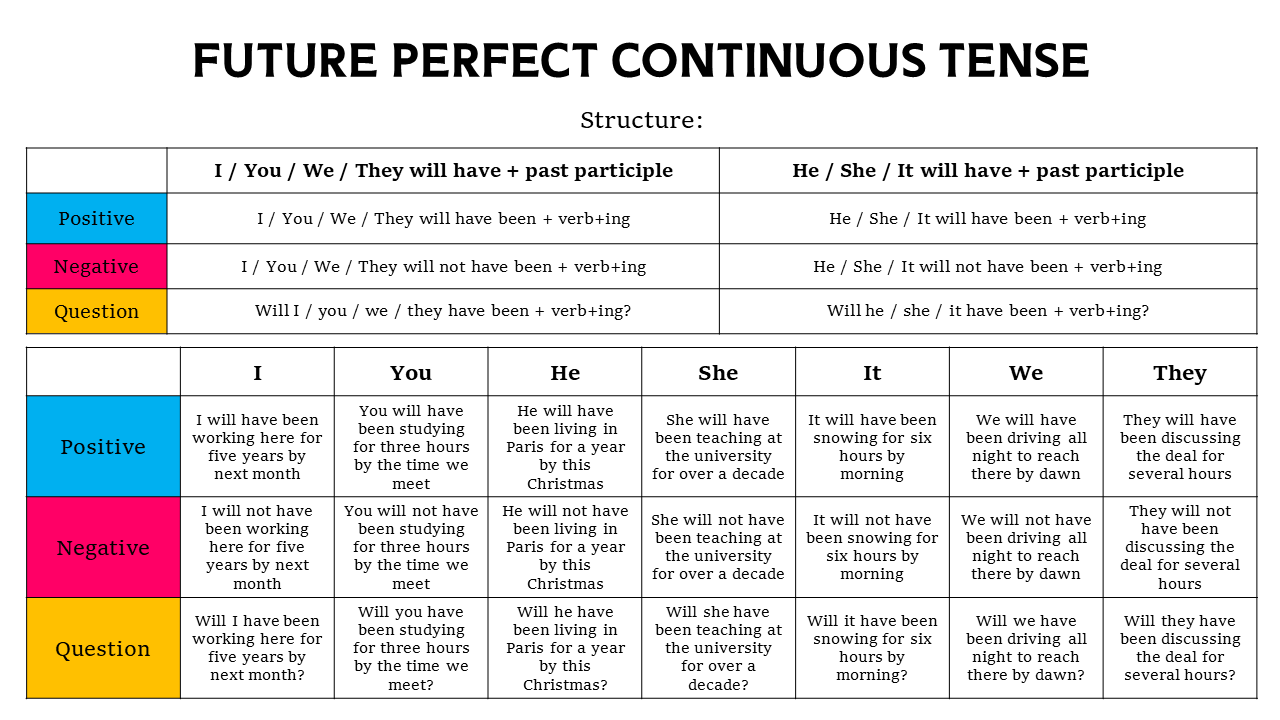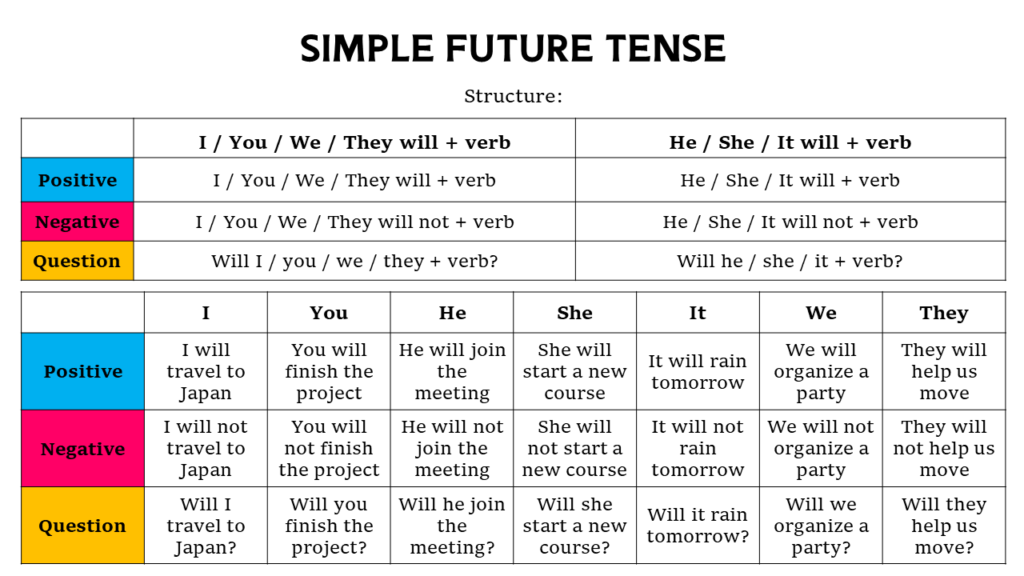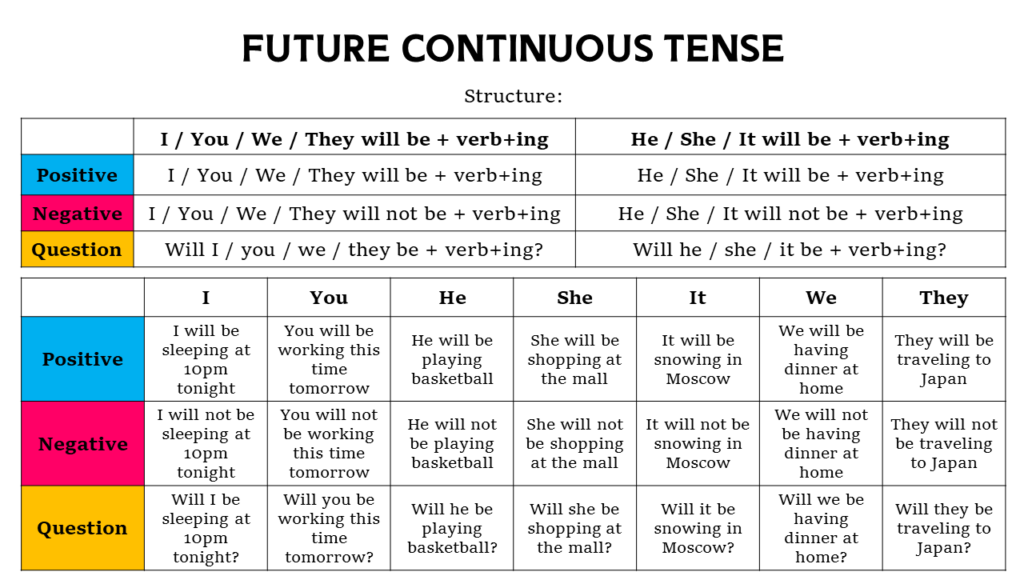In the realm of English grammar, the future perfect continuous tense offers a glimpse into actions that will be ongoing up to a certain point in the future. It’s a fascinating structure that allows us to contemplate the duration of activities that will lead us to a specific future moment.
Definition
The future perfect continuous tense is employed to describe actions that will be ongoing until a specified future time, emphasizing the continuous nature of the activity leading up to that point. It combines elements of duration and completion in anticipation of future events.
Formula/Structure
Crafting sentences in the future perfect continuous tense involves the auxiliary verbs “will have been” followed by the present participle (-ing form) of the main verb. Let’s break down the structure:
- Affirmative: Subject + will have been + present participle
- Example: “By next year, I will have been working here for ten years.”
- Negative: Subject + will not (won’t) have been + present participle
- Example: “They won’t have been waiting for too long by the time you arrive.”
- Interrogative: Will + subject + have been + present participle?
- Example: “How long will you have been studying by the end of the semester?”
Rules with Examples
- ‘Will have been’ for all subjects: Unlike some tenses, ‘will have been’ remains constant regardless of the subject. “She will have been living in this city for five years.”
- Emphasis on duration: This tense emphasizes the ongoing nature of an activity leading up to a specific future point. “He will have been traveling around the world for six months by then.”
- Future reference point: Use time expressions to specify the future moment when the action will be ongoing. “By next Friday, we will have been rehearsing for the play for three weeks.”
How to Make Future Perfect Continuous Tense
1. Positive Future Perfect Continuous Tense
Express ongoing actions that will continue up to a specified future time using “will have been” followed by the present participle of the verb.
2. Negative Future Perfect Continuous Tense
Indicate that an ongoing action will not continue up to a specified future time by adding “not” after “will have been.”
3. Interrogative Future Perfect Continuous Tense
Form questions about the duration of ongoing actions leading up to a specific future time by starting with “will,” followed by the subject, “have been,” and the present participle.
Examples of Future Perfect Continuous Tense
Examples of Positive Future Perfect Continuous Tense
- “By this time next year, they will have been living in their new house for six months.”
- “I will have been studying English for ten years by the time I graduate.”
- “She will have been working on her novel for two years by then.”
- “We will have been waiting for the bus for an hour by 8 AM.”
- “He will have been running his own business for a decade by the end of the decade.”
- “They will have been traveling around the world for six months by the time they return.”
- “By next month, I will have been learning the piano for a year.”
- “The team will have been practicing for the competition for weeks by then.”
- “She will have been teaching at the university for a decade next year.”
- “They will have been saving money for their trip for months by the time they leave.”
Examples of Negative Future Perfect Continuous Tense
- “He won’t have been working on the project for too long by next week.”
- “We won’t have been waiting for you for hours by the time you arrive.”
- “She won’t have been studying for the exam all night by tomorrow.”
- “They won’t have been living in the city for too long by next year.”
- “The plant won’t have been growing for too many weeks by next month.”
- “You won’t have been waiting for too long by the time the movie starts.”
- “I won’t have been exercising for hours by the time you come back.”
- “They won’t have been playing the game for too long by tomorrow.”
- “She won’t have been working at the company for too many years by then.”
- “We won’t have been traveling for too many hours by the time we reach our destination.”
Examples of Interrogative Future Perfect Continuous Tense
- “How long will you have been studying by the end of the semester?”
- “By next week, how long will they have been living in the new apartment?”
- “How long will she have been working on the project by the deadline?”
- “By tomorrow morning, how long will you have been waiting for the train?”
- “How long will they have been practicing for the concert by next month?”
- “By the time she retires, how long will she have been teaching at the school?”
- “How long will he have been running the company by next year?”
- “By the end of the year, how long will they have been saving for their vacation?”
- “How long will you have been working on your thesis by the defense date?”
- “By next month, how long will the team have been preparing for the match?”

Exercise of Future Perfect Continuous Tense With Answers
Questions
- They (to work) on the project for ten hours by the time you arrive.
- She (not to sleep) for too long by tomorrow morning.
- (you to practice) the piano for five years by the concert?
- He (to travel) for six months by the time he reaches Australia.
- We (not to wait) for the bus for too long by the time it arrives.
- (it to rain) for hours by the time the storm passes?
- The athletes (to train) for the marathon for months by the race day.
- You (not to read) the book for too many days by next week.
- (she to study) for the exam all night by tomorrow morning?
- Will they (to work) on the project for hours by the time you come back?
Answers
- They will have been working on the project for ten hours by the time you arrive.
- She won’t have been sleeping for too long by tomorrow morning.
- Will you have been practicing the piano for five years by the concert?
- He will have been traveling for six months by the time he reaches Australia.
- We won’t have been waiting for the bus for too long by the time it arrives.
- Will it have been raining for hours by the time the storm passes?
- The athletes will have been training for the marathon for months by the race day.
- You won’t have been reading the book for too many days by next week.
- Will she have been studying for the exam all night by tomorrow morning?
- Will they have been working on the project for hours by the time you come back?
This exercise is designed to strengthen your understanding of the Future Perfect Continuous Tense. Review the answers to gauge your comprehension and continue practicing to master the usage of this intriguing tense.


